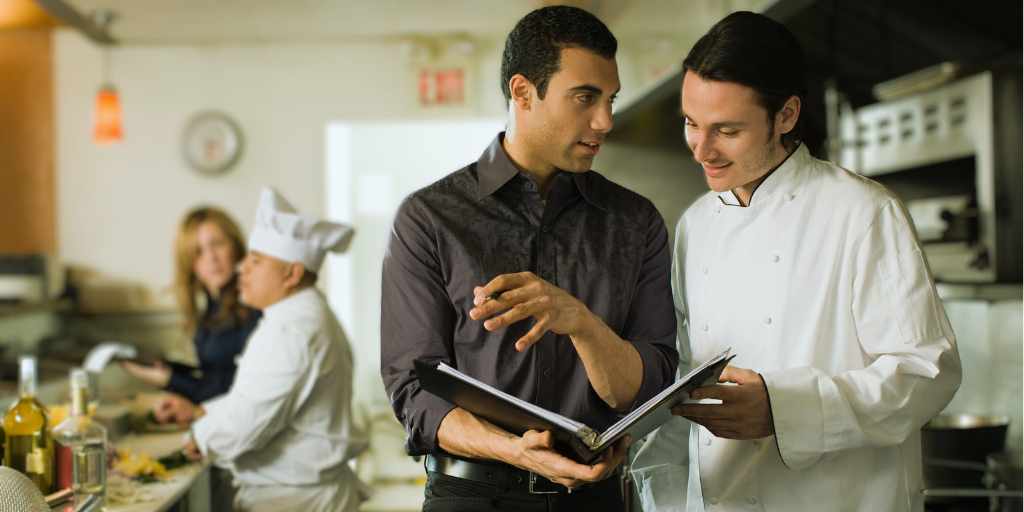In the fast-paced and dynamic world of restaurants, having clearly defined positions and titles is crucial for seamless operations. Each role within a restaurant plays a vital part in delivering exceptional service and ensuring customer satisfaction. In this comprehensive guide, we will explore the diverse range of positions and their corresponding duties across various departments, from management to kitchen staff, service personnel, and support roles. Let’s dive in and discover the key responsibilities and skills required for each position.
List of Restaurant Positions and Duties
When running a restaurant, it takes a well-coordinated team to succeed. Here is a breakdown of the common positions found in restaurants, along with their respective duties:
Common Restaurant Staff Positions
In a restaurant, various common staff positions contribute to the smooth operation of the establishment. We’ll look at them here.
General Manager Job Description
As the leader of the restaurant, the general manager shoulders the responsibility of overseeing all operations. From managing finances to ensuring customer satisfaction, their role is pivotal. They create and implement strategies, coordinate with department heads, and handle any challenges that arise.
Assistant Manager Job Description
The assistant manager works closely with other assistant managers and the general manager, providing support in various areas. They assist in managing daily operations, handling employee schedules, customer complaints, addressing customer concerns, and maintaining a smooth workflow.
Sample Restaurant Manager Job Description
A restaurant manager is responsible for overall performance and profitability. They oversee staff, maintain quality standards, and ensure compliance with health and safety regulations. Excellent communication and leadership skills are essential for success in this role.
Skills Required
To thrive in the restaurant industry, there are essential skills that employees across various positions must possess. These include effective communication, organizational abilities, teamwork, adaptability, and problem-solving skills.
Kitchen Positions and Titles
The kitchen is the heart of any restaurant, where culinary artistry comes to life. Let’s explore the key positions and their unique contributions:
Sous Chef Job Description
Working under the executive chef, the sous chef supervises the kitchen staff, assists in menu planning, ensures food quality, and maintains a smooth workflow. Their expertise lies in managing kitchen operations, coordinating food preparation, and ensuring timely service.
Executive Chef Job Description
The executive chef is the creative force behind the restaurant’s menu. They are responsible for recipe development, food quality, and managing the kitchen team. With a formal education and a strong culinary background, they lead by example and strive for culinary excellence.
Line Cook Job Description
Line cooks are the backbone of the kitchen, responsible for both preparing food and cooking dishes according to the head chef’s specifications. They work in a fast-paced environment, ensuring the timely delivery of high-quality meals to customers.
Kitchen Manager
The kitchen manager oversees the day-to-day operations in the kitchen. They manage inventory, coordinate food orders, and ensure adherence to safety and hygiene standards. A detail-oriented approach and strong leadership skills are vital in this role.
Quick Service Restaurant Job Descriptions
Quick-service restaurants (QSRs) require efficient staff to work quickly and efficiently meet the demands of fast-paced service. Let’s take a closer look at the key positions within this segment:
Fast Food Job Descriptions
Short Order Cook or Line Cooks.
In a fast-food setting, short-order cooks are responsible for preparing quick meals to meet customer demands. They must excel in multitasking and have excellent knowledge of cooking techniques and menu items to ensure fast and accurate service.
In a contemporary kitchen, a line cook and a short-order cook perform essentially the same role. As a result, the term “short order cook” has become outdated and is no longer commonly used, except in a few rural diners. However, there was a time when being a short-order cook was a distinct position. These cooks could be found in diners, truck stops, and local restaurants, skillfully preparing simple dishes to order. For example, if you ordered a steak and eggs, they would cook it for you, much like in any restaurant you visit today.
Cashier Job Description
Cashiers in fast food establishments handle customer transactions, process orders, and provide friendly service. They must possess strong attention to detail and the ability to handle cash registers effectively.
Food Runner Job Description
Food runners play a crucial role in ensuring the quick and efficient service and delivery of food from the kitchen to the dining area. They coordinate with servers, double-check order accuracy, and maintain a smooth flow of service.
Fine Dining Restaurant Positions
Fine dining establishments offer an elevated culinary experience where attention to detail and impeccable service are paramount. Let’s explore the key positions within fine dining restaurants in this segment:
Food and Beverage Manager
The food and beverage manager oversees all aspects of the dining experience. They ensure exceptional service, manage the dining room staff, handle customer inquiries, and maintain a harmonious atmosphere. Strong leadership and organizational skills are crucial in this position.
Chef Garde Manager
The chef-garde manager specializes in cold dishes, salads, and food presentations. They bring artistic flair to culinary creations and ensure that each plate is visually appealing. Attention to detail and a passion for aesthetics are essential traits for this role.
Pastry Chef
The pastry chef is responsible for creating delectable desserts and pastries. They possess expertise in baking techniques, flavour combinations, and artistic decoration. Precision, creativity, and a strong understanding of flavour profiles are hallmarks of a successful pastry chef.
Service Positions and Titles
In addition to the kitchen staff, the service team plays a crucial role in ensuring a memorable dining experience. Let’s explore some key service positions:
Sommelier
The sommelier is a wine expert who curates an exceptional wine list, advises guests on wine selection, and ensures proper wine service. Their knowledge of various grape varietals, regions, and pairing techniques is essential for enhancing the dining experience.
Bartender Job Description
Bartenders are skilled mixologists who craft and serve a wide array of beverages. They excel in preparing drinks, engaging with customers, and maintaining a well-stocked bar. Strong communication skills, creativity, and knowledge of cocktails are vital in this role.
Barista Job Description
Baristas are experts in coffee preparation and specialize in crafting the perfect cup. They deeply understand coffee beans, brewing methods, and latte art. Attention to detail, speed, and friendly customer service are key attributes of a skilled barista. See this article for the differences between Bartenders and Baristas.
Server Job Description
Servers are the frontline representatives of the restaurant, providing excellent customer service. In the dining room, they take orders, serve food and beverages, and ensure guest satisfaction. Effective communication, attentiveness, and a friendly demeanour are essential for servers.
A Sample Job Description for a Restaurant Host
The restaurant host is responsible for welcoming guests, managing reservations, and seating customers. They create the restaurant’s first impression and set the tone for the dining experience. Exceptional interpersonal skills and organizational abilities are crucial in this role.
Support Positions and Titles
Support positions play a vital role in maintaining the smooth operation of a restaurant. Let’s explore a few key support positions:
Barback
Barbacks support bartenders by stocking supplies, cleaning glassware, and maintaining the bar area’s cleanliness. They are crucial in ensuring the bartender’s efficiency and providing excellent service. Many bartenders get their start as barbacks, and it’s a good way to get into the industry when you have no experience.
Cashier Job Description
Cashiers handle financial transactions, process payments accurately, and provide friendly customer service. Attention to detail, mathematical proficiency, and excellent customer service skills are essential in this role.
Food Runner Job Description
Food runners ensure the timely delivery of cold food items prepared from the kitchen to the dining area. They coordinate with the kitchen and servers to deliver food and maintain efficient service and accuracy in order delivery.
Busser Job Description
Bussers assist in clearing and resetting tables, ensuring the cleanliness and organization of the dining area. They support the servers in maintaining a smooth workflow and providing a pleasant dining environment.
Dishwasher Job Description
Dishwashers are responsible for cleaning dishes, utensils, and kitchen equipment. They maintain the cleanliness and sanitation of the kitchen, ensuring prep cooks have a hygienic environment for food preparation.
Conclusion
Having well-defined positions and titles within a restaurant is crucial for creating an organized and efficient work environment. Each position uniquely delivers exceptional food, service, and overall dining experiences to customers. From the general manager overseeing operations to the talented kitchen staff, dedicated servers, and support roles, every individual contributes to the success of the establishment.
Effective communication, teamwork, and a customer-centric approach are key elements that bind the different positions together. The diverse range of skills and responsibilities across various roles ensures that every aspect of the restaurant is well-managed and aligned towards achieving a common goal: providing memorable dining experiences.
By understanding the specific duties and skills required for each position, restaurant owners and managers can effectively recruit, train, and nurture their team members. Creating a positive work environment, fostering professional growth, and recognizing the contributions of each employee in day-to-day tasks are essential for building a cohesive and motivated team.
Remember, a well-structured restaurant team is the foundation for success in the competitive culinary industry. By investing in your staff, nurturing their skills, and promoting a culture of excellence, you set the stage for an outstanding dining experience that keeps customers returning.
Frequently Asked Questions (FAQ)
Are restaurant positions and titles standardized across all establishments?
While common positions and titles are found in most restaurants, the specific titles and responsibilities can vary depending on the restaurant owner or establishment’s size, cuisine, and organizational structure. It’s important to understand the unique requirements of each restaurant and tailor the positions accordingly.
How can I determine the skills and qualifications required for a specific restaurant position?
Reviewing job descriptions and researching industry standards can provide insights into the skills and qualifications expected for a particular position. Additionally, seeking input from industry professionals, attending industry events, and networking can help you stay updated on the latest trends and requirements.
Can a person hold multiple roles within a restaurant?
In some cases, particularly in smaller establishments, employees may have overlapping responsibilities or hold one or multiple areas or roles. This often requires flexibility, adaptability, and the ability to multitask effectively.
How can I ensure effective communication and collaboration between different positions in the restaurant?
Regular staff meetings, clear communication channels, and fostering a culture of open dialogue can facilitate effective communication and collaboration among different positions. Encouraging teamwork, providing training opportunities, and establishing clear expectations can also contribute to a cohesive work environment.
How can restaurant staff enhance their skills and advance in their careers?
Continued education, professional development programs, and seeking mentorship opportunities can help restaurant staff enhance their skills and advance in their careers. Participating in workshops, attending industry conferences, and staying updated on industry trends are also beneficial.
What does a restaurant server do?
A restaurant server takes customer orders, delivers food and beverages, and ensures a positive dining experience. They provide menu recommendations, answer customer questions, handle payment transactions, and maintain cleanliness and order in their assigned sections.
What is a restaurant server called?
A restaurant server is commonly called a “waiter” or “waitress.” They are responsible for taking orders, serving food and beverages, and providing attentive customer service to ensure a positive dining experience. If there is no cashier position, they take payments as well.
What is the difference between a waiter and a server?
Traditionally, the term “waiter” or “waitress” has been used to refer to servers in fine dining establishments. In contrast, “server” is a more general term used in various restaurant settings. However, the terms are often used interchangeably in the modern restaurant industry.
What are the highest-paid restaurant servers?
The earning potential for restaurant servers can vary depending on factors such as the type of fine dining establishment, geographical location, and experience level. Fine dining establishments, high-end restaurants, or those in busy metropolitan areas tend to offer higher earning potential for servers.
What skills do you need to be a waitress?
To be a successful waitress, key skills include excellent communication and interpersonal skills, the ability to multitask and work in a fast-paced environment, strong organizational abilities, attention to detail, problem-solving skills, and the ability to work a friendly and customer-oriented demeanour.
Is it hard being a server?
Being a server can be demanding as it requires dealing with high-pressure situations, managing multiple tasks simultaneously, and providing excellent customer service. However, a good server with the right skills, training, and a positive attitude can find it to be a rewarding and fulfilling career choice.
Remember, success in the restaurant industry is not just about individual positions; it’s about how all the positions work together as a cohesive team. By recognizing the value and importance of each role, restaurants can create an exceptional dining experience that keeps customers satisfied and coming back for more.
What is a waiter’s assistant called?
A waiter’s assistant is commonly called a “busser” or “server assistant.” Their role is to support the waitstaff by clearing tables, refilling water glasses, and assisting with various tasks.
Who is a kitchen assistant in a restaurant?
A kitchen assistant, also known as a “kitchen helper” or “kitchen support staff,” assists the chefs and cooks in various tasks such as food preparation, cleaning, and organizing kitchen utensils.
What is a fancy name for a restaurant worker?
A fancy term for a restaurant worker could be “gastronomy professional,” “culinary specialist,” or “food and beverage expert.” These terms emphasize the expertise and professionalism of individuals working in the restaurant industry.
What is the slang term for the kitchen?
The kitchen is often referred to as the “galley,” “the back of the house (BOH),” “the dish”, or simply “the line” in restaurant slang.
What is a kitchen intern called?
A kitchen intern is commonly known as a “culinary intern”, “kitchen apprentice”, or referred to as a “stage.” It is an unpaid internship where cooks immerse themselves in new techniques and gain valuable experience.
Staging was a prevalent form of culinary education before culinary schools became popular, and many renowned chefs started their careers by staging, drawing inspiration from those they learned from.
What is another name for a Kitchen Assistant?
Another name for a Kitchen Assistant is a “Kitchen Helper,” “Prep Cook,” or “Culinary Assistant.” They work alongside the chefs and cooks to assist in food preparation and maintain cleanliness in the kitchen.
What do you call restaurant staff?
The staff working in a restaurant is collectively referred to as the “restaurant staff” or “restaurant team.” It includes various positions such as servers, bartenders, hosts/hostesses, executive chefs,, and managers.




